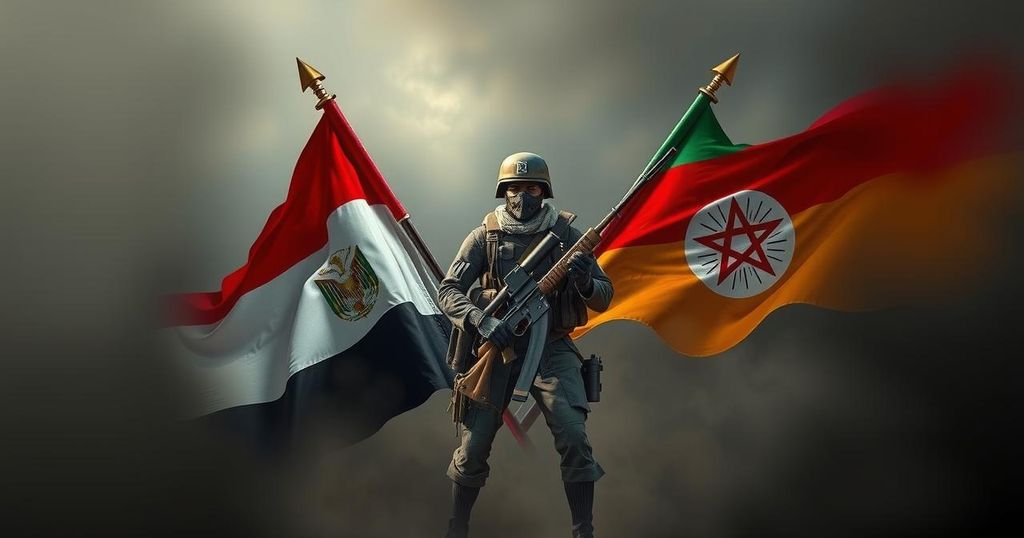Egypt-Somalia Defense Pact: Implications for Stability and Security Against Al-Shabaab
Somalia’s defense pact with Egypt jeopardizes its relations with Ethiopia, which is crucial in the fight against al-Shabaab. The ongoing violence and military challenges highlight the need for cohesive political and military strategies. European intervention is necessary to mediate rising tensions and support Somalia’s stability, as the potential security vacuum could exacerbate the extremist threat in the region.
Somalia’s recent defense agreement with Egypt has heightened tensions with Ethiopia, complicating efforts to combat al-Shabaab, a militant group threatening stability in the region. The attack on a military base in Mogadishu underscores the ongoing violence and underscores the challenges facing Somalia’s federal government as it strives to consolidate power against factions such as al-Shabaab. As the African Union’s peacekeeping mandate in Somalia approaches expiration, the implications of the Egypt-Somalia pact may jeopardize established military partnerships crucial to restoring security and governance. Despite some military gains against al-Shabaab in recent years, the group continues to control significant territories in southern Somalia, capitalizing on existing political rifts within the anti-al-Shabaab coalition. The defense pact between Somalia and Egypt, calling for potential troop deployments, signals a strategic shift that could alienate Ethiopia, the predominant troop contributor to the African Union Mission in Somalia (ATMIS). This development risks igniting an intra-regional conflict that would embolden al-Shabaab’s operations and further destabilize an already volatile political landscape. The cooperative security framework originally established among Somalia, Ethiopia, and international partners faces severe strain due to historical grievances related to territorial sovereignty. Ethiopia’s involvement in Somalia’s stabilization has been crucial, with thousands of troops deployed as part of regional security efforts. However, Somalia’s bilateral agreement with Egypt, amidst a backdrop of deteriorating relations with Ethiopia over issues like the Grand Ethiopian Renaissance Dam and Somaliland, has created an environment ripe for exploitation by militant factions. Egypt’s engagement, including recent arms shipments to Somalia, exacerbates Ethiopia’s security concerns, potentially engendering a military escalation that threatens regional peace. Should Ethiopia’s contributions to the ATMIS dwindle due to Somali governmental machinations, the vacuum left could allow al-Shabaab to extend its territorial control, with consequential ramifications for the broader Horn of Africa region. Consolidating security and political stability in Somalia is paramount yet increasingly elusive, especially as factions vye for influence amidst rising tensions. Somali state-building efforts already display fractures, exemplified by divisions among regional authorities regarding relationships with Ethiopian forces. The potential withdrawal of Ethiopian troops, critical for various state governments, could lead to increased violence and power struggles among armed groups, facilitating al-Shabaab’s resurgence and exacerbating Somalia’s governance crises. Thus, the need for European intervention through diplomatic and security channels is urgent. The European Union, equipped with significant investment and diplomatic heft, has the capacity to mediate escalating tensions between Somalia, Egypt, and Ethiopia. Efforts should involve fostering communication among key stakeholders, including influential actors like Turkey and the UAE, who exert considerable influence over Somalia’s conflicting parties.
The geopolitical tensions between Somalia, Egypt, and Ethiopia critically impact efforts to stabilize Somalia amidst the ongoing threat posed by al-Shabaab. Established military collaborations and communication channels have played vital roles in attempting to maintain peace. However, emerging defense alliances introduced by Somalia and their implications for Ethiopia’s involvement may jeopardize previous gains in combating terrorist factions and establishing governmental authority. The current security landscape is tumultuous as a result of historical grievances surrounding resources such as the Nile River and territorial integrity, stressing the need for coherent international responses grounded in mediation and support for the Somali state-building process.
In conclusion, the new defense pact between Somalia and Egypt could severely undermine efforts to combat al-Shabaab by diminishing Ethiopia’s role and influence in the region. The potential destabilization resulting from heightened tensions risks creating a security vacuum that al-Shabaab may exploit, further complicating Somalia’s recovery and peace efforts. Immediate diplomatic interventions supported by international actors, particularly the European Union, are essential to mitigate these tensions and preserve the fragile stability in Somalia and the surrounding region.
Original Source: ecfr.eu




Post Comment